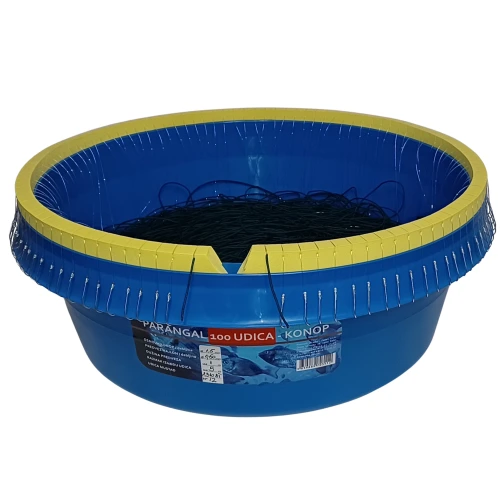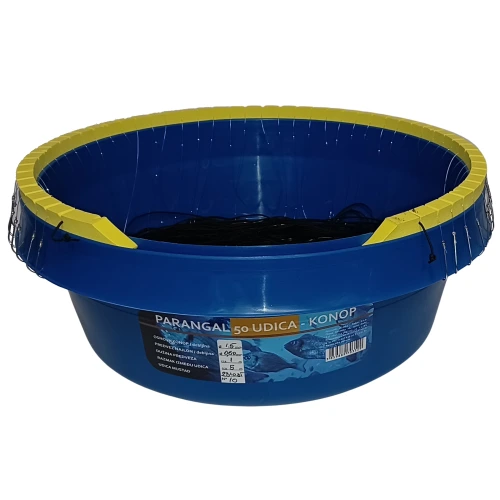Mar
Longline for Dentex: An Expert Guide to Successful Fishing
Introduction: The Importance and Challenge of Dentex Fishing
Dentex dentex -represents one of the most attractive species for sport fishing in the Mediterranean, especially because of its combativeness and valuable meat. Its hunting requires specific equipment and techniques, and the longline has proven to be an extremely efficient tool, especially when hunting larger specimens.
In this guide we will analyze in detail:
- Optimum configuration of longlines for tines
- Choosing hooks and baits with the highest success rate
- Installation techniques and the most favorable fishing locations
- Correct practice in accordance with fishing regulations
1. Technical Specifications of Longlines for Dentex
1.1 Basic Selection Criteria
Base material: Synthetic braid (1.5–2.0 mm) or strong nylon 0.80 mm
- Base material: Synthetic braid (1.5–2.0 mm) or strong nylon 0.80 mm
- Number of hooks: 30–100 (depending on local regulations)
- Leader length: approx. 1 m (for a more natural bait presentation)
- Distance between hooks: approx. 5 m (reduces entanglement)

1.2 Hooks: Types and Sizes
For dentex fishing, hooks with long necks and increased strength are used:
| Manufacturer | Model | Size |
|---|---|---|
| Mustad | 2310DT | 5–9 |
| Varivas | Big Mouth | 3/0–5/0 |
| Owner | SSW | 2/0–4/0 |
Note: Larger hooks (5/0–7/0) are used for live bait, while smaller ones (2–4) may be suitable for pieces of fish.
2. Bait Strategies and Bait Selection
2.1 Natural Bait
The dentex is a predator that prefers live prey, but will also respond to fresh dead bait. The best results are achieved with:
- Live fish:
- Picarel (Spicara smaris)
- Seabream (Diplodus annularis)
- Sardinella (Sardinella aurita)
- Pieces of fish and cephalopods:
- Sardine(Engraulis encrasicolus)
- Squed(Loligo vulgaris)
- Octopus(Octopus vulgaris)
2.2 Bait Preparation Techniques
- Live bait: They attach to the hook through the back (avoiding vital organs) to remain active.
- Pieces of fish: The best results are given by pieces with preserved skin (they retain the smell better).
3. Setting Longlines: Best Practice
3.1 Locations and Depths
Dentex is most often found on:
- Rocky terrain (reefs, underwater cliffs)
- Transition zones between sand and rocks
- Depths: 15–50 m (depending on the season)
3.2 Laying Procedure
- Equipment Preparation: Check knots and leads before laying.
- Installation of signal ropes: Be sure to mark the beginning and end of the longline using rope and lead rope ropes
- Laying in the direction of the current: The lead must keep the longline at the bottom.
- Time control: It is recommended to check the longline every 45–60 minutes.
4. Legal Regulation and Ethics of Fishing
4.1 Longline Regulations
- Maximum number of hooks: 100 (in Croatia)
- Mandatory signaling: marker buoys with the vessel's registration number
- Minimum tooth size: 30 cm
4.2 Principles of Responsible Fishing
- Release of smaller specimens: Fish below the minimum size are returned to the sea.
- Choosing sustainable baits: Avoid endangered species.
- Minimizing bottom damage: Careful placement on rocky terrain.
5. Performance Analysis: Catch Log
| Location | Depth (m) | Bait | number of catches |
|---|---|---|---|
| Kornati | 25–30 | the prince lives | 4 dentex (3–5 kg) |
| Pelješac | 35–40 | piece of squid | 2 dentex (4–6 kg) |
| Vis | 20–25 | Sardines | 3 dentex (2–4 kg) |
Conclusion: The highest success rate is achieved with live bait at depths between 25–40 m.
6. Conclusion and Recommendations
Longline represents the most efficient tool for dentex hunting, especially when using:
✅ Strong material (braid 1.5 mm + Mustad hooks)
✅ Live bait (picarel, seabream)
✅ Correct installation (rocky bottom, depth 20–50 m)
Find dentex longlines and other fishing equipment in our web shop!



